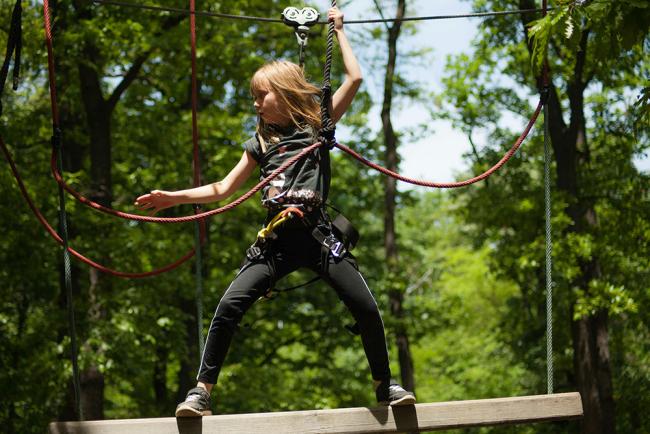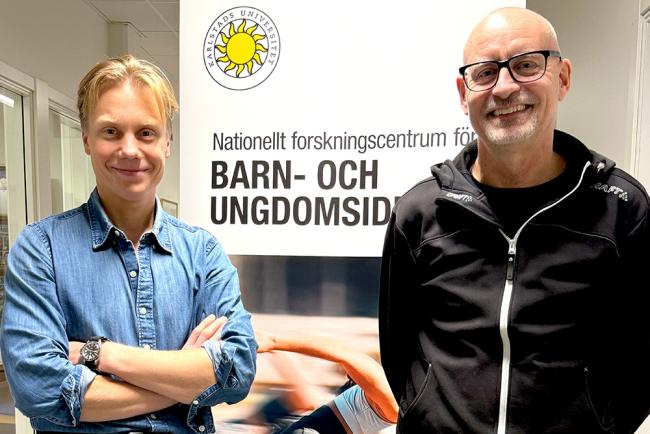Innovative Study to Encourage Children to Be More Physically Active
2025-11-14How can we get sedentary children to move more? A new research study aims to find out in collaboration with children in grades 2 and 3 in primary school. The idea is to identify alternative activities to traditional sports that can be practiced after school. Karlstad University is conducting the study together with several other universities and in cooperation with Karlstad Municipality.
Physical inactivity is a growing public health problem that brings escalating societal costs. One area that is currently neglected is physical activities for children who do not want to participate in sports during their leisure time. What alternative activities to sports exist after school for children who are not very physically active? There are plenty of studies where children themselves highlight the need for alternatives to the current offerings, which largely consist of traditional competitive sports.
"Children themselves are asking for a variety of movement activities with low barriers and without competition and rivalry that lead to exclusion," says Johan Högman, Associate Professor of Sports Science at Karlstad University. However, to know whether such activities work in practice, well-designed interventions are needed to test this. The purpose of this project is to co-create and evaluate a sustainable leisure-based intervention, called ‘EASY’, together with physically inactive children, where alternative physical activities are developed to meet their needs.
The long-term goal is to develop an evidence-based program that can be used in health promotion work within preventive healthcare and in municipalities.
"By leisure activity, I mean activities that take place after school, in collaboration with preschools and schools. The idea is that children should be able to come to a new environment, outside school and outside sports, where they can engage in different activities that still allow them to move. That is why this is done in cooperation with the Department of Culture and Leisure in Karlstad Municipality as well as preschools and schools."
Is it socially accepted not to want to play sports and compete?
"In research contexts, I often hear that this type of study singles out physically inactive children and, not least, their parents. I am currently writing a book about how we approach parents on this topic, and my experience is that parents want all the tips they can get on how to get their children moving. Children are also very clear that they want advice on how to be active. They feel that the range of sports is too narrow—they want a broader selection of movement activities. The current offerings are so competition- and sports-oriented that many children cannot find an activity they enjoy. We need other alternatives to sports to make more children think that moving is fun and worth participating in."
The research project will start with a pilot study in early 2026 — can you tell us a bit about that?
"We will first carry out our intervention on a small scale with 30 children. We want to test whether the format works for them. The children will help decide the different co-created activities in workshops. They will then try out the activities to see how they experience them and whether they feel right. We will also test our measurement tools in the pilot study, such as activity trackers, questionnaires, and evaluation protocols that we will use to gather results."
What happens next?
"After the pilot, we will conduct the main study and recruit about 130 children from grades 2 and 3. We will run a 12-week program, like a school term of leisure activities. One day a week, the children will participate in a group activity where they can try different movement activities. The children will have helped decide what these activities should be, such as dog walking, dance, exergaming (active video games), trampoline jumping, and more."
When do you expect to present the first results?
"Results from the pilot project will be presented in early 2027. The main study results will be reported in the first part of 2028. We will measure, among other things, confidence in their self-esteem and overall well-being. We want the children to find a way to move that makes them feel good."
The project, carried out within the framework of the National Research Center for Child and Youth Sports, will run until 2029. Children and parents in Karlstad Municipality will be able to register their interest in participating next year.
The project “A Co-Produced Intervention to Increase Physical Activity Among Inactive Children – The Intervention ‘EASY’ (Exploring Alternative movements my StYle)” is funded by Forte with SEK 4,918,000. The research is led by Johan Högman, Associate Professor of Sports Science, together with Stefan Wagnsson, Associate Professor of Sports Science at the Department of Educational Studies, Karlstad University, in collaboration with the University of Gothenburg, Örebro University, Halmstad University, Liverpool John Moores University, and the Department of Culture and Leisure, Karlstad Municipality.




